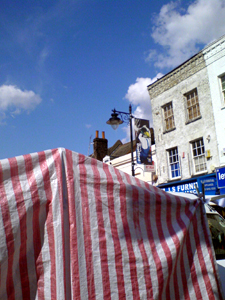We Come From Your Future: Dispatch Six 25 May 2008
Ultra-red

Echo-mining at Deptford Market
Field Composition Six: Echo-mining Deptford Market
With its food stalls spread out into side-streets and onto the pavement, Deptford Market has for decades served the local community as a place for fruits, vegetables, meat, fish and spices of all sorts. Knock-off designer clothes, shoes, pet products, fabrics, electronics, plants and a large rummage yard expand the market's repertoire. Friends tell us that this site is also a site of anti-racist normativity.
Wandering the aisles with microphone in hand, we mine the market for echoes of an earlier history. Not far from the Deptford merchants lies the site of the 1977 Lewisham march. Threatened by the provocations of BNP sympathisers to claim the streets of Lewisham, residents amassed by the thousands. Their objective was single-minded: Crush the BNP and their racist allies. The march arose from a specific analysis where the struggles of anti-racism aligned with anti-fascism. To oppose the fascists meant opposing racism and to oppose racism meant opposing the fascists.
Culturally, much has changed as a result of actions like the Lewisham march. Today's condition of everyday life is marked by an anti-racist normativity. This normativity forecloses certain forms of political action once so effective in the past. As conditions absorb yesterday's interventions, employing those same past tactics fails to listen to the analysis arising from the conditions of today. Walking through Deptford market, one can hear in the fabric of voices just how the actions of the past play out in mundane conviviality. Today's anti-racism announces itself in silence. With the codes of exchange woven from the echoes of yesterday, anti-racism speaks in what can’t be heard. And, inversely, anti-racism is heard in what can't be said. Silence and silenced. In this situation anti-racism is a preliminary term, gathering instances of anti-racism into the corpus of everyday life. This is not to say normativity spreads in the absence of racism. On the contrary, those very instances of anti-racism hold within them traces of racist violence. Conviviality wraps itself in the fears and hatreds of the other. Thus, a question emerges: if anti-racism is supposed to be for us and among us, then where is it? How do we raise the call of anti-racism without also amplifying the racism that stands by its side?
It is not enough to think about the everyday life instances of anti-racism. The everyday life that people inhabit is always already segregated. When and in what spaces do they co-inhabit at all? Thus, a tension rises between anti-racist normativity and the segregation of everyday life. Add to the latter the larger realities of structural racism in immigration and foreigner laws, the constant recomposition of migration, and the racist exploitation of London's service workers. Furthermore, the nearly irresistible pull of institutionalisation has caged anti-racism into a national framework for over three decades, reinforcing limited access and the value-forms of participation. Institutionalisation creates competition for funds needed to organise, normalises a strategy of ethnicisation, and applies tokenism and favouritism. Nearly everywhere, we hear the same thing: pervasive institutionalisation retreats from activating communities and normalises institutionalised anti-racism (where such a normativity labours equally to normalise racism). Black and white become placeholders for the bureaucratic processes of racialisation. Meanwhile, the recomposition of migration has destabilised the left's analysis of today's conditions of racism. Is it any wonder the tactics of yesterday hold their appeal?
We are not surprised that, when asked to identify the sound of anti-racism, people typically name a sound of racism. Everyone agrees; racism exists. Some have even gone so far as to argue that racism is now everywhere and nowhere. The distribution of racism today is commensurate with a proliferation of its forms across and within the culture. Along with the distribution of racisms, it seems, there is a commensurate distribution of anti-racisms. In other words, there is an everyday life anti-racism that exists in social relationships, places of commerce, schools and hospitals, and on public transportation. People constantly resist racism as the very means by which they navigate the every day.
Is an anti-racist politics NEITHER institutionalised, nor a repetition of the past, even possible?
We are investigating a field whose complexity is so pervasive that the very conditions to act do not yet exist. Who will find familiar the sounds of anti-racism that we will have collected randomly throughout our investigation? With microphone in hand, we navigate through sites listening for echoes of acts that contribute to the organisation of their very own condition of possibility.
We ask: What is the sound of anti-racist normativity?
Field Report Six by Ultra-red
Regularise Undocumented Workers
Dispatch TwoDay of Action to Abolish No Recourse to Public Funds
Dispatch ThreeMigrant Organising In The Rural South West
Dispatch FourNext Stop
Dipatch FiveSounding Alexandra Court
Online EpisodesFollow this link for an introduction to the project by Ultra-red as well as links to all audio compositions and texts.
